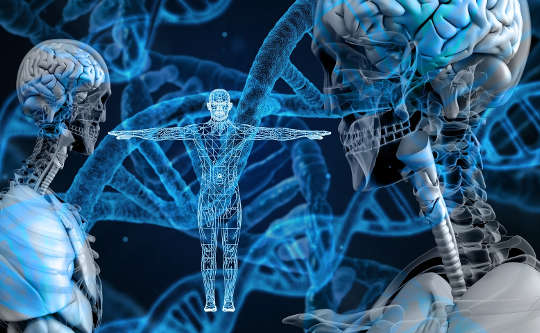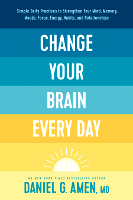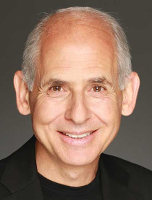
Image by Gerd Altmann
We all want to have better lives, less stress, more joy, more focus, more success. But to have all this we need to understand our brains—and the importance of brain health. As a doctor who has studied the brain for my whole career, I’ve narrowed down this seemingly enormous endeavor to 8 core pillars. Everything we do that has to do with brain health stems from these.
The 8 Core Pillars of Brain Health
1. Listen to what 225,000 brain SPECT scans can tell us.
The brain-imaging work I began over 30 years ago has taught me many important lessons. SPECT is an imaging tool that measures activity in the brain, and it shows us areas of the brain that have healthy activity, too much activity, or too little activity. When there is overactivity or underactivity, it can be associated with problems related to moods, anxiety, lack of focus, anger, memory loss, and more. The key message, however, is that you are not stuck with the brain you have. You can make it better, and with a better brain comes a better life.
2. Learn how the brain functions and how to optimize this “hardware of your soul.”
Your brain is involved in everything you do, including how you think, feel, act, and interact with others. Your brain creates your mind, and I like to call it the hardware of your soul. Your brain is an organ, just like your heart, lungs, and kidneys are organs. The same way you need to care for your physical health for these organs to function properly, you need to care for your brain on a daily basis—with a healthy diet, exercise, new learning, adequate sleep, and more—so it functions optimally.
3. Manage your mind to support your happiness, inner peace, and success—the “software” that runs your life.
While your brain is the hardware, your mind is the software. You need to learn to program this software by disciplining your mind, including how you think and talk to yourself. How you feel is often related to the quality of your thoughts. If they’re mostly negative, you’ll feel mostly negative. If they’re mostly positive, you’ll feel mostly positive. Here’s the thing: Thoughts occur automatically. They just happen. If you’re filled with automatic negative thoughts (ANTs), you need to challenge them and ask yourself if they are true. When you make it a daily habit to eliminate the ANTs and replace them with more accurate thinking, it will boost your moods, heighten confidence to achieve your goals, and fill you with a greater sense of peace.
4. Create a lifelong plan to deal with whatever stresses come your way.
We can’t eliminate stress, but we can control how we respond to it with stress-management techniques like deep breathing. We can also improve our ability to withstand it with our everyday habits. I coined the term “brain reserve” to describe the extra brain tissue or function you have available to cope with stress. Every day, you are either increasing your brain reserve or draining it. To boost your brain reserve, follow these three simple strategies: (1) Love your brain. (2) Avoid the things that hurt your brain. (3) Do the things that help your brain.
5. Use your brain to improve your relationships—your network connections.
If you want to have better relationships with the important people in your life, train your brain to notice what you like more than what you don’t like. Where you place your attention about others determines their behavior. Noticing what you like on a daily basis encourages more of the behaviors you like to happen. Research shows this really works, as marriages with five times more positive comments than negative ones are significantly less likely to result in divorce.
6. Develop an ongoing sense of meaning and purpose that informs your actions every day.
Having a sense of purpose beyond ourselves allows us to live a life that matters and helps us stay focused on the daily activities that will help us achieve our goals. To know your purpose, think about the one thing you love to do (cooking, design, crunching numbers, etc.) that you feel capable of teaching others, how it benefits others, and how it transforms their lives. My purpose in life is helping people who are struggling with mental health, memory issues, and more to have better brain health and as a result they have better lives. Every day, I ask myself if my behavior fits my goals.
7. Leverage the best brain-focused nutrition and nutraceuticals (targeted supplements) to support your brain and mind.
Here’s a starter list of foods that enhance the function of your brain: organic colorful fruits and vegetables, especially avocados and blueberries; dark chocolate (without the sugar and dairy); beets (which increase blood flow to the brain); healthy fats (including healthy oils, fatty fish—such as sardines and salmon—nuts, and seeds); and herbs and spices, especially saffron, turmeric, and cinnamon. For optimal brain health, I recommend that everyone take the following nutraceuticals every day: a multivitamin, omega-3 fatty acids, vitamin D (if necessary to optimize your level), and a probiotic.
8. Learn how to approach past trauma, anxiety, depression, addictions, ADD/ADHD, and more with condition-specific wisdom.
Our brain-imaging work shows us that mental health issues are not single or simple disorders. They all have multiple types. With brain imaging, I’ve seen that depression, for example, has at least seven patterns. Depression and other mental health disorders don’t stem from just one cause, so giving everyone the same treatment invites failure. Knowing the type of depression—or anxiety, addiction, or ADD/ADHD—you have is critical to getting the right help. That being said, starting a daily brain-health practice can be beneficial for anyone who is struggling with mental health.
As a brain doctor, I’ve come to see how central these pillars are—and how important it is for everyone who seeks a better life to understand them. Then, you’ll be able to implement simple daily practices that truly do help you find that happiness, focus, and purpose that comes from having a healthier brain. All it takes is a year and a commitment.
Copyright 2023. All Rights Reserved.
BOOK BY THIS AUTHOR: Change Your Brain Everyday
Change Your Brain Everyday: Simple Daily Practices to Strengthen Your Mind, Memory, Moods, Focus, Energy, Habits, and Relationships
by Daniel G. Amen, MD
 In Change Your Brain Every Day psychiatrist and clinical neuroscientist Daniel Amen, MD, draws on over 40 years’ clinical practice with tens of thousands of patients to give you the most effective daily habits he has seen that can help you improve your brain, master your mind, boost your memory, and make you feel happier, healthier, and more connected to those you love.
In Change Your Brain Every Day psychiatrist and clinical neuroscientist Daniel Amen, MD, draws on over 40 years’ clinical practice with tens of thousands of patients to give you the most effective daily habits he has seen that can help you improve your brain, master your mind, boost your memory, and make you feel happier, healthier, and more connected to those you love.
In the pages of Change Your Brain Every Day, you’ll get a year’s worth of life-changing daily wisdom from Dr. Amen, one of the world’s most prominent psychiatrists.
For more info and/or to order this book, click here. Also available as an Audiobook and as a Kindle edition.
About the Author
 Daniel G. Amen, MD is a physician, board-certified child and adult psychiatrist, award-winning researcher, 17-time bestselling author, and in-demand speaker. He's Founder and CEO of Amen Clinics, which holds the world’s largest database of functional brain scans relating to behavior. He's lead researcher on a landmark brain imaging and rehabilitation study on pro football players. He’s been on health-related podcasts, television programs, books, articles, music albums, and movies; and made numerous court and public appearances.
Daniel G. Amen, MD is a physician, board-certified child and adult psychiatrist, award-winning researcher, 17-time bestselling author, and in-demand speaker. He's Founder and CEO of Amen Clinics, which holds the world’s largest database of functional brain scans relating to behavior. He's lead researcher on a landmark brain imaging and rehabilitation study on pro football players. He’s been on health-related podcasts, television programs, books, articles, music albums, and movies; and made numerous court and public appearances.
His new book is Change Your Brain Everyday: Simple Daily Practices to Strengthen Your Mind, Memory, Moods, Focus, Energy, Habits, and Relationships. Vist his website at DanielAmenMD.com/
More books by this Author.

























